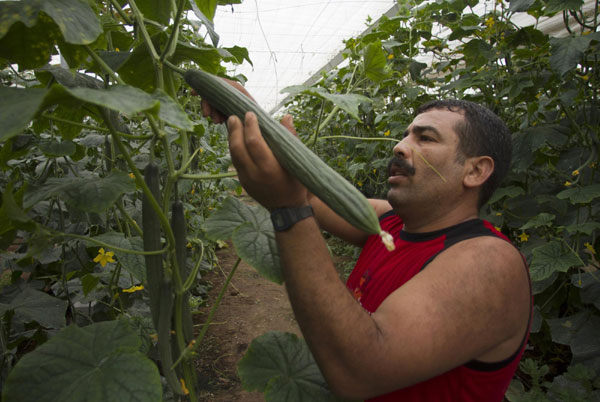Global General
EU health body says German E. coli outbreak serious
(Agencies)
Updated: 2011-05-29 16:38
 |
Large Medium Small |
 |
|
A worker harvests cucumbers in a greenhouse in El Ejido in Andalucia, in southeast Spain, May 26, 2011. [Photo/Agencies] |
LONDON - An E. coli outbreak in Germany which has infected more than 270 people and killed at least five is one of the biggest of its kind worldwide and the largest ever in Germany, European health experts said on Saturday.
German officials said on Thursday they suspected cucumbers imported from Spain as a possible source of the outbreak of hemolytic-uremic syndrome (HUS), a serious complication of a type of E. coli known as Shiga toxin-producing E. coli (STEC).
In a risk assessment of the outbreak, the Stockholm-based European Centre for Disease Prevention and Control (ECDC), which monitors disease in the European Union, called it "one of the largest described outbreaks of STEC/HUS worldwide and the largest ever reported in Germany".
It said latest reports were of 276 cases of HUS in Germany since April 25. Smaller numbers of cases have also been reported in Sweden, Denmark, the Netherlands and Britain - all linked with recent travel to Germany.
German officials say five people have died so far, but the ECDC said its latest information was that two people had died, both of them women.
The ECDC also said this outbreak was unusual because it was hitting mostly adults, particularly women.
"While HUS cases are usually observed in children under five years of age, in this outbreak 87 percent are adults, with a clear predominance of women (68 percent)," it said.
HUS affects the blood, kidneys and, in severe cases, the central nervous system. It is a serious illness that requires hospital treatment.
New cases are still being diagnosed and reported, the ECDC said, so it should be "assumed that the source of infection is still active."
Health officials have advised people in Germany to avoid eating cucumbers, tomatoes and lettuces and some of these products have been removed from the shelves of shops.
| 分享按钮 |